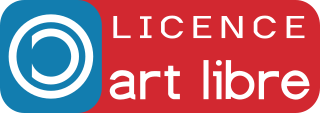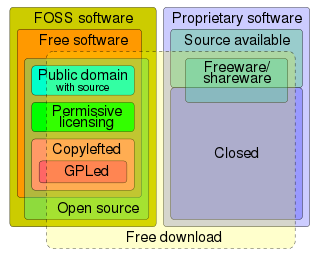
Free software, libre software, libreware sometimes known as freedom-respecting software is computer software distributed under terms that allow users to run the software for any purpose as well as to study, change, and distribute it and any adapted versions. Free software is a matter of liberty, not price; all users are legally free to do what they want with their copies of a free software regardless of how much is paid to obtain the program. Computer programs are deemed "free" if they give end-users ultimate control over the software and, subsequently, over their devices.

Open-source licenses are software licenses that allow content to be used, modified, and shared. They facilitate free and open-source software (FOSS) development. Intellectual property (IP) laws restrict the modification and sharing of creative works. Free and open-source licenses use these existing legal structures for an inverse purpose. They grant the recipient the rights to use the software, examine the source code, modify it, and distribute the modifications. These criteria are outlined in the Open Source Definition.

Free music or libre music is music that, like free software, can freely be copied, distributed and modified for any purpose. Thus free music is either in the public domain or licensed under a free license by the artist or copyright holder themselves, often as a method of promotion. It does not mean that there should be no fee involved. The word free refers to freedom, not to price.

The Free Art License (FAL) is a copyleft license that grants the right to freely copy, distribute, and transform creative works except for computer hardware and software, including for commercial use.
Open-source record labels are record labels that release music under copyleft licenses, that is, licenses that allow free redistribution and may allow free modification of the tracks.

A software license is a legal instrument governing the use or redistribution of software.

The free-culture movement is a social movement that promotes the freedom to distribute and modify the creative works of others in the form of free content or open content. They encourage creators to create such content by using permissive and share-alike licensing, like that used on Wikipedia.
A permissive software license, sometimes also called BSD-like or BSD-style license, is a free-software license which instead of copyleft protections, carries only minimal restrictions on how the software can be used, modified, and redistributed, usually including a warranty disclaimer. Examples include the GNU All-permissive License, MIT License, BSD licenses, Apple Public Source License and Apache license. As of 2016, the most popular free-software license is the permissive MIT license.
This comparison only covers software licenses which have a linked Wikipedia article for details and which are approved by at least one of the following expert groups: the Free Software Foundation, the Open Source Initiative, the Debian Project and the Fedora Project. For a list of licenses not specifically intended for software, see List of free-content licences.
The ISC license is a permissive free software license published by the Internet Software Consortium, now called Internet Systems Consortium (ISC). It is functionally equivalent to the simplified BSD and MIT licenses, but without language deemed unnecessary following the Berne Convention.
License compatibility is a legal framework that allows for pieces of software with different software licenses to be distributed together. The need for such a framework arises because the different licenses can contain contradictory requirements, rendering it impossible to legally combine source code from separately-licensed software in order to create and publish a new program. Proprietary licenses are generally program-specific and incompatible; authors must negotiate to combine code. Copyleft licenses are commonly deliberately incompatible with proprietary licenses, in order to prevent copyleft software from being re-licensed under a proprietary license, turning it into proprietary software. Many copyleft licenses explicitly allow relicensing under some other copyleft licenses. Permissive licenses are compatible with everything, including proprietary licenses; there is thus no guarantee that all derived works will remain under a permissive license.

The GNU Affero General Public License is a free, copyleft license published by the Free Software Foundation in November 2007, and based on the GNU GPL version 3 and the Affero General Public License (non-GNU).

Free content, libre content, libre information, or free information is any kind of creative work, such as a work of art, a book, a software program, or any other creative content for which there are very minimal copyright and other legal limitations on usage, modification and distribution. These are works or expressions which can be freely studied, applied, copied and modified by anyone for any purpose including, in some cases, commercial purposes. Free content encompasses all works in the public domain and also those copyrighted works whose licenses honor and uphold the definition of free cultural work.

A free-software license is a notice that grants the recipient of a piece of software extensive rights to modify and redistribute that software. These actions are usually prohibited by copyright law, but the rights-holder of a piece of software can remove these restrictions by accompanying the software with a software license which grants the recipient these rights. Software using such a license is free software as conferred by the copyright holder. Free-software licenses are applied to software in source code and also binary object-code form, as the copyright law recognizes both forms.
BSD licenses are a family of permissive free software licenses, imposing minimal restrictions on the use and distribution of covered software. This is in contrast to copyleft licenses, which have share-alike requirements. The original BSD license was used for its namesake, the Berkeley Software Distribution (BSD), a Unix-like operating system. The original version has since been revised, and its descendants are referred to as modified BSD licenses.

Copyleft is the legal technique of granting certain freedoms over copies of copyrighted works with the requirement that the same rights be preserved in derivative works. In this sense, freedoms refers to the use of the work for any purpose, and the ability to modify, copy, share, and redistribute the work, with or without a fee. Licenses which implement copyleft can be used to maintain copyright conditions for works ranging from computer software, to documents, art, and scientific discoveries, and similar approaches have even been applied to certain patents.

The GNU Free Documentation License is a copyleft license for free documentation, designed by the Free Software Foundation (FSF) for the GNU Project. It is similar to the GNU General Public License, giving readers the rights to copy, redistribute, and modify a work and requires all copies and derivatives to be available under the same license. Copies may also be sold commercially, but, if produced in larger quantities, the original document or source code must be made available to the work's recipient.

Software categories are groups of software. They allow software to be understood in terms of those categories, instead of the particularities of each package. Different classification schemes consider different aspects of software.
A free license or open license is a license that allows copyrighted work to be reused, modified, and redistributed. These uses are normally prohibited by copyright, patent or other Intellectual property (IP) laws. The term broadly covers free content licenses and open-source licenses, also known as free software licenses.

David M. Berry is a Professor of Digital Humanities at the University of Sussex, writer and musician. He is widely published on academic work related to the fields of critical theory, digital humanities, media theory and algorithms.
















